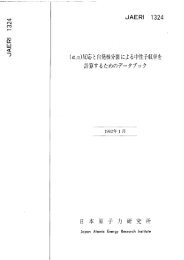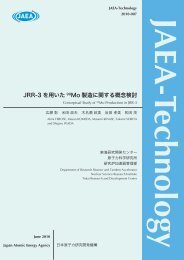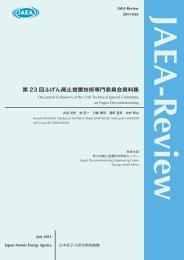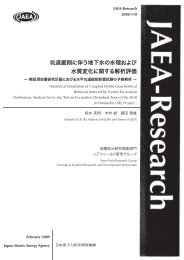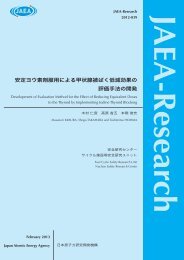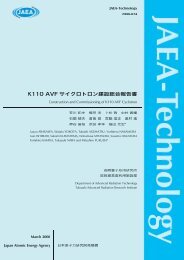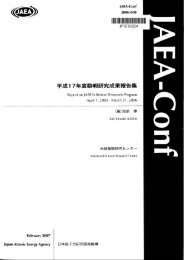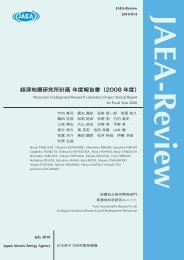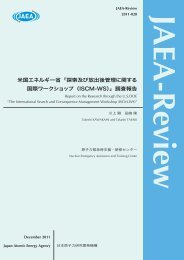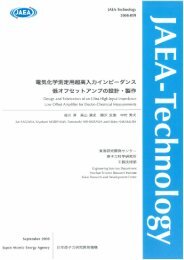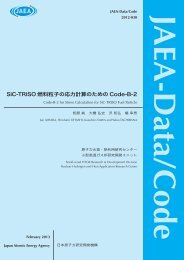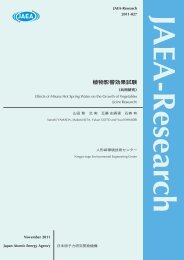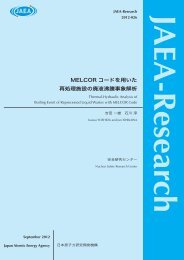JAEA-Conf 2011-002 - 日本原子力研究開発機構
JAEA-Conf 2011-002 - 日本原子力研究開発機構
JAEA-Conf 2011-002 - 日本原子力研究開発機構
Create successful ePaper yourself
Turn your PDF publications into a flip-book with our unique Google optimized e-Paper software.
INRNE-BAS: Recent State and Future Prospects<br />
Mitko K. Gaidarov<br />
Institute for Nuclear Research and Nuclear Energy,<br />
Bulgarian Academy of Sciences<br />
Blvd. Tzarigradsko chaussee 72, 1784 Sofia, Bulgaria<br />
e-mail: gaidarov@inrne.bas.bg<br />
In this presentation a review of the Institute for Nuclear Research and Nuclear Energy<br />
(INRNE) of the Bulgarian Academy of Sciences (BAS) will be done. The main accent is to<br />
show the mission and the vision of the Institute, its structure and the general scientific<br />
activities. First, a short historical introduction will be made. A special attention will be paid to<br />
the international contacts of INRNE (with world-wide organizations, institutions and<br />
universities) which are very important for the successful Institute staff’s work. As it was<br />
concluded by the 2009 Science Review Committee for INRNE from the side of the European<br />
Science Foundation (ESF) and the All European Academies (ALLEA) Federation, “INRNE is<br />
currently well placed in the national and international context, having gained considerable<br />
experience in international collaborations”. As a part of the international collaboration, the<br />
INRNE participation in the Sixth and Seventh Framework Programs of European Commission<br />
(EC) is given. Particularly, the Institute’s participation in SPIRAL2 project in GANIL<br />
(France) being one of the EC infrastructure projects with a priority will be considered. The<br />
two basic experimental facilities of INRNE, namely the Nuclear Scientific and Experimental<br />
Centre with Research Reactor and the Basic Environmental Observatory “Moussala” are<br />
presented. A specific view on the present state of the Nuclear Theory Laboratory of the<br />
INRNE, one of the laboratories in the field of theoretical nuclear and particle physics in<br />
Bulgaria, will be done. The publication activity for the last few years, knowledge<br />
dissemination and innovation transfer are shown together with the educational activity<br />
performed by the scientists of the Institute. Finally, the future plans in developing of INRNE<br />
are indicated. For more details, please use the Institute web-site: http://www.inrne.bas.bg/<br />
1. Introduction<br />
<strong>JAEA</strong>-<strong>Conf</strong> <strong>2011</strong>-<strong>002</strong><br />
The Institute for Nuclear Research and Nuclear Energy is one of the biggest within the<br />
Bulgarian Academy of Sciences. It is the leading complex center in Bulgaria for scientific<br />
research and applications of the nuclear science and technologies and studies of their<br />
interactions with the environment. INRNE guarantees a high quality performance of research<br />
and innovation activities, addressed to support important national programs, keeping abreast<br />
with the modern scientific achievements. With its longstanding experience and active<br />
collaboration with leading European and international institutions, INRNE contributes to the<br />
progress of the physical science.<br />
The Physical Institute of BAS was established on July 1 1946 by academician Georgi<br />
Nadjakov who became its first director. In 1962 the Physical Institute of BAS was renamed as<br />
the Physical Institute with a Nuclear Experimental Facility. A crucial factor for the nuclear<br />
research in Bulgaria became its membership at the Joint Institute for Nuclear Research<br />
established in Dubna near Moscow in 1956. In 1972 the Institute of Physics split into Institute<br />
for Nuclear Research and Nuclear Energy and Institute of Solid State Physics.



